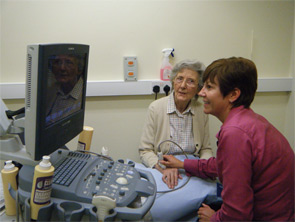
For a person who claims she “fell” into rheumatology, Patricia “Trish” Cornell, BSc, has influenced treatment processes in a remarkably short time. Cornell, the senior rheumatology practitioner at Poole Hospital National Health Service (NHS) Foundation Trust in Dorset, England, joined the rheumatology unit there in 1998. Since that time, she’s been instrumental in organizing the outpatient teams that manage the day-to-day care of patients with inflammatory arthritis. She oversees a team composed of six rheumatology practitioners (including both nurses and physiotherapists), a podiatrist, an occupational therapist, and extended-scope physiotherapy practitioners. She has revamped and streamlined the Telephone Advice Line, ensuring patient access and continuity of care, and set up specialty clinics for patients with ankylosing spondylitis (AS).
Cornell presented her work on patient self-management at national and international meetings and worked to advance the role of rheumatology nurse specialists through association with the Royal College of Nursing Rheumatology Forum and the British Health Professionals in Rheumatology. Her department has received numerous awards for excellence, among them the National Rheumatoid Arthritis Society’s 2007 Patient in Focus Award for improving communication between healthcare professionals, patients, and their caregivers and relatives.
Susan M. Oliver, RN, MSc, a nurse consultant in rheumatology and past chair of the Royal College of Nursing Rheumatology Forum, has been a mentor in Cornell’s development as a spokesperson for the nursing perspective. “I’ve visited Trish’s unit a number of times,” she says. “She has great organizational skills and has made sure it’s a strong multiprofessional team that’s very, very clear about what they’re delivering to patients.”
“I’ve seen her grow and grow in her strategic and political thinking, to make sure that there is a nursing presence at the table,” adds Oliver. “We share the same principles when working to develop high-quality nursing—that is, to robustly scrutinize nursing practice and listen to the patient’s perspective to ensure that nursing provides the best outcomes for patient care.”
“I think that her landmark achievements center on getting systems in place so that rheumatology practitioners can work alongside the doctors,” says Paul Thompson, MD, consultant rheumatologist at Poole Hospital and visiting professor and director of the Center of Postgraduate Medical Research and Education at Bournemouth University, Bournemouth, U.K. “Her organizational skills have been fantastic, and setting up a treatment process for patients is quite difficult to do in our conventional National Health Service, which is a bit slow to move.”
Audio Extra
Propitious Meeting
Dr. Thompson vividly recalls his first encounter with Cornell at a private hospital where he was working in addition to his post at Poole Hospital. “She came up to me in the corridor and said, very straightforwardly, as Trish does, ‘I’m an orthopedic nurse. I’ve heard you’ve got a good set-up at Poole Hospital and you’re interested in expanding the role of nurses and allied health professionals. Can I join you?’ Well, when somebody says that to you, you think, ‘Hello, this looks good, but what’s the catch?’ ”
As it turned out, there was no catch. Cornell and Dr. Thompson were meeting at a propitious moment. Dr. Thompson had, indeed, been planning to expand the concept of the rheumatology practitioner, using NHS nurses and physiotherapists who could take over the management of arthritis patients following their initial diagnoses. “I was looking for somebody to take that whole service forward from a nursing point of view,” he says.

For her part, Cornell had recently left Queen Alexandra’s Royal Navy Nursing Service, where as a lieutenant she had run a 100-bed orthopedic trauma ward and served time on board Primary Casualty Receiving Ship RFA Argus during the first Gulf War crisis. “I was looking around for what I wanted to do next,” she recalls. “I didn’t know much about rheumatology, but the position sounded interesting. So I applied for the job, and surprisingly, I got it! We had just got a new drug, leflunomide, and everything was just turning around in terms of what we could offer patients. It all got really, really interesting in rheumatology.”
Always Focused on Nursing
Although rheumatology wasn’t in her sights until the late 1990s, Cornell intended to enter nursing from a very early age. Her mother was a pediatric nurse and she recalls that she also wanted to be a nurse even at the age of eight or nine years. While in senior school, she began to explore her training options and took part in a work experience at a local airbase in Cornwall. Naval personnel advised her to train at a school of nursing and then join the Navy as a Sister [a rank in Queen Alexandra’s Royal Naval Nursing Service] so that she could enter as an officer. She became a Registered General Nurse in 1985 and in 1987, at the Bristol and Weston School of Nursing, got her specialization in orthopaedic/trauma nursing.
Her natural drive for new challenges bolstered her successful career with the Royal Navy Nursing Service. She supplemented her nursing expertise with leadership courses at the Britannia Royal Navy College. “I wanted to further my education because I was getting bored,” she says, “and I decided to get a management qualification.”
In October 1990, as the first Gulf War began to counter Saddam Hussein’s invasion of Kuwait, Cornell was deployed to the Persian Gulf to run the medical ward on board RFA Argus. She was in charge of the 75-bed trauma unit that received casualties picked up by the air support squadron. That six-month experience, she says, “made me think about leadership more, how to manage the department and manage staff.” Her guiding principle: “I don’t ask people to do something that I wouldn’t do myself. You always try to lead from the front.”

Those whom she has mentored will attest to that quality of leading by example. Jane SeQueira, a senior physiotherapist practitioner at Poole Hospital, says, “Trish has a lot of courage, and I think that’s just innate for her.” She and Cornell developed a clinic for AS patients modeled on the concepts for other inflammatory arthritis patients. “She came up with this concept because she’s got loads of ideas. That’s one of her strong points: She is a real idea factory,” notes SeQueira. After they began to see improved patient outcomes, Cornell encouraged SeQueira to develop her presentation skills so that they could present their results at the British Health Professionals in Rheumatology and later at the 2009 ACR/AHRP Annual Scientific Meeting in Philadelphia. “She has expanded me beyond the usual confines of physiotherapy,” says SeQueira. “You don’t often get opportunities like this, so I am grateful.”
The Whole Patient
Today, the rheumatology unit at Poole has six rheumatology practitioners. The roles for physicians and practitioners are quite specific. Once a diagnosis has been made, explains Dr. Thompson, the consultant makes sure the patient gets into the practitioners’ follow-up system. Thanks to Cornell, that system builds on the nursing and physiotherapy skill sets to holistically address patients’ needs, supplying education, follow-up, and ready access to the clinic when patients have questions.
The result, says Dr. Thompson, is tighter control of inflammatory arthritis. “We’ve found that by instituting protocols that [the practitioners] stick to, we’ve been able to move the management of patients forward.” There’s also that “magic bit of time,” he says, while practitioners are measuring disease activity and reviewing blood tests when they can listen to patients’ narratives. They often discover psychosocial factors that influence the progression of patients’ conditions. For example, he says, a patient may come in having a disease flare. During a conversation with the nurse consultant, the patient may reveal that the family dog just died, creating psychological distress and a lowered pain threshold. That is a patient who may not need to be treated with steroids if their distress level can be addressed with comfort measures and compassion from the nursing staff, he notes.
Timeline
1985 – Becomes staff nurse at East Reach Hospital, Taunton
1985 – Earns RGN from Somerset School of Nursing
1986 – Becomes staff nurse at ITU/CCU Musgrove Park Hospital, Taunton
1987 – Completes orthopaedic and trauma specialist course at Bristol and Weston School of Nursing
1988 – Joins the Trauma Unit at Poole Hospital
1989 – Becomes a Sister/Lieutenant in Queen Alexandra’s Royal Navy Nursing Service
1990 – Completes teaching and assessing specialist course at Plymouth School of Nursing
1995 – Receives diploma in management from the College of Further Education Plymouth
1999 – Completes rheumatology specialist course at Oxford Brookes University
2001 – Receives a Nurse Practitioner BSc from Bournemouth University
Judicious use of steroids dovetails with the unit’s concept of tight control in inflammatory arthritis, say Dr. Thompson and Cornell. The sooner patients’ medication concerns, disease flares, and other questions are addressed, the better their outcomes. Between visits, patients can call the Telephone Advice Line and receive prompt answers to their concerns. Selwyn C.M. Richards, MD, MSc, MA, BM BCh, who is the clinical lead for the rheumatology and back pain service at Poole Hospital, notes that Cornell “re-audited that [Telephone Advice Line], showing that we’re resolving a lot of questions about medications and seeing patients quickly for disease flares. So it gives the patients access to us, whereas otherwise they’d be seeing their primary care physicians who have much less experience in the field. We’re saving the primary care workload through the help line, and we’re really improving compliance by making patients feel confident that we’re monitoring their care.”
It’s been no small feat to further patient empowerment and self-management to achieve better disease control within the sometimes difficult setting of the National Health Service, notes Dr. Richards. “There are two approaches that she has taken—one is that if you treat rheumatoid arthritis aggressively and early with conventional drugs, you have a much smaller need for biologics,” he says. “I think if patients don’t have access, their disease gets worse, and you end up spending more on your drug budget. So she saves money on drugs by rapid access and aggressive early treatment and tight control.”
Another advantage to Cornell’s approach is that she identifies the patients who need to be seen more frequently and those who can be seen less frequently, Dr. Richards notes. “If you’ve got longstanding, stable rheumatoid arthritis, instead of seeing them in three months, she’ll see them yearly but still give them access if they’re in trouble,” he says. “And she’ll free up spaces by prioritizing those that need to be seen frequently. She doesn’t bankrupt us, thankfully!”
Challenges Remain
Careful attention to budget issues will be crucial in the coming period for rheumatology and all those working in the National Health Service, Cornell believes. It will be important, she says, to “make sure that government is aware of the consequences of ignoring chronic disease. I think we have been the ‘poor relations’ before now, because [the majority of] funding has gone to cardiac disease, diabetes, and cancer.” General misperceptions about inflammatory arthritis persist among the lay public as well as governmental officials, she notes. “You might think that because arthritis is a chronic disease that it is a ‘cheap’ disease and that you don’t need to put much funding into it. But, in fact, it can be expensive because, in the long term, these people have massive problems with mobilization and often end up needing joint replacement surgery.” It’s also been shown that 40% of those with rheumatoid arthritis lose their jobs within the first two years of diagnosis, resulting in lost productivity and lost human capital while adding to the strain on the healthcare delivery system.
Trish Cornell now serves on the European League Against Rheumatism’s Scientific Committee and continues to raise the national and international profile of nursing as well as her own achievements. Nevertheless, when told that she had been selected for a profile article in The Rheumatologist, she responded modestly: “But I’m not an academic. I’m very much a clinical worker, and I’ve just tried to forward the cause for rheumatology nursing.”
In that venture, as in her others, she has successfully done so. Rheumatology nurse consultant Sarah Ryan recalls hearing Cornell deliver her first paper on the audit of the Telephone Advice Line at a British Health Professionals in Rheumatology meeting in the late 1990s. “This innovative idea is now standard practice in most rheumatology departments and is understandably very popular with patients. I did not know Trish when I listened to her presentation, but at the time I was struck by her calm, confident, knowledgeable, and professional manner. She was then and remains now a role model for all rheumatology nurses.”
Gretchen Henkel is writing the “Profiles in Rheumatology” series.


